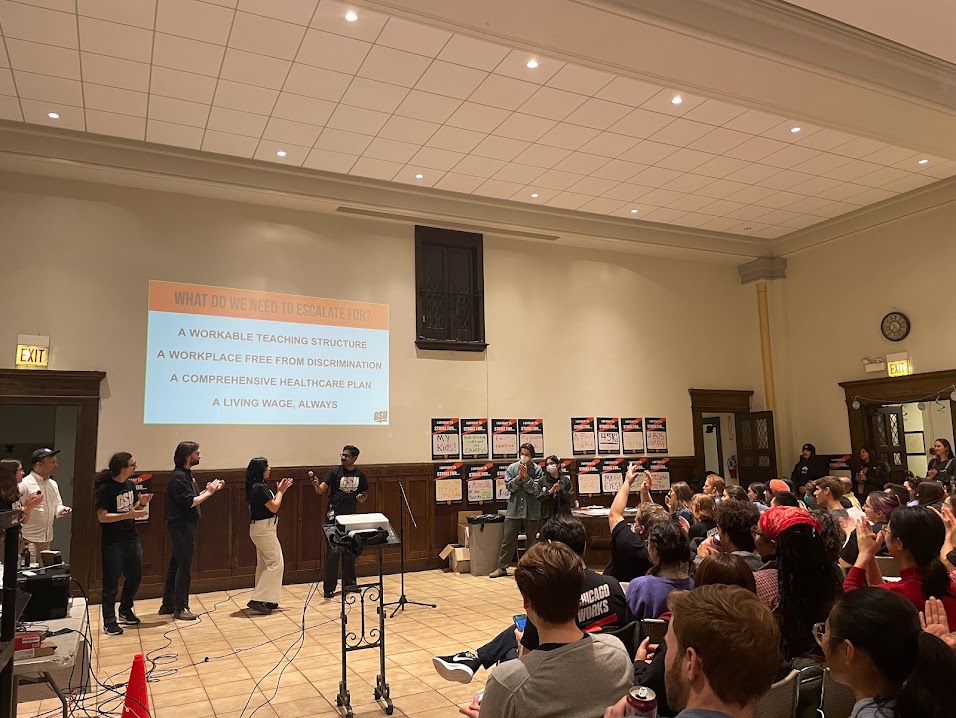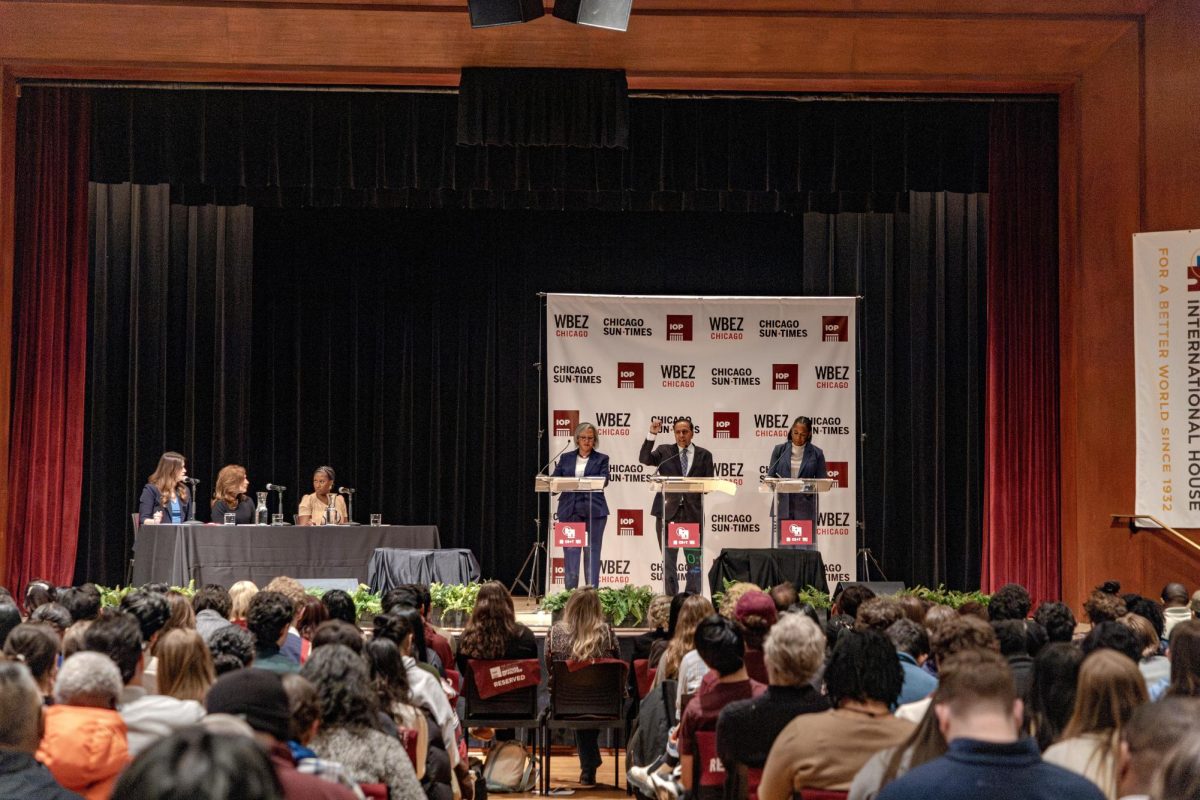Graduate Students United–United Electrical (GSU-UE) has collected over 1,000 signatures for a strike pledge it launched on February 8, becoming the second labor union on campus preparing to strike if negotiations with the University reach a standstill.
If GSU-UE were to move forward with the next step—a strike authorization vote—they would be joining UChicago Medicine nurses, represented by National Nurses United (NNU). The Nurses Union is proceeding with a strike authorization vote on February 20.
A GSU-UE general membership meeting to launch the strike pledge took place on Thursday at Hyde Park Union Church, less than an hour after their latest eight-hour bargaining session with the University. Around 500 members attended the 6 p.m. meeting, comprising both in-person and Zoom attendees.
“We will be out on your picket lines if you guys make [the] move [to strike],” UChicago Medicine nurse and NNU representative Amber Turi announced in a show of full solidarity for GSU-UE.
GSU-UE first notified the University of intent to mobilize at a January 22 bargaining session. “At the mere mention of our strike pledge, the University put five new benefits on the table,” read the Union’s February 9 general membership newsletter, “A Storm is Brewing! (Sign the Strike Pledge).”
“If management doesn’t move, we know how to make them move. This is how we do it,” said GSU-UE bargaining committee member Valay Agarawal.
A statement from Provost Katherine Baicker released the day after the meeting indicates the University is taking the potential for a strike seriously.
“A strike would be harmful to graduate students and the University community. Striking graduate students would not be paid during a strike, and progress toward their academic degrees might be affected,” the statement read. “However, should GSU-UE decide to strike, the University will be prepared to minimize disruption to our campus community.”
GSU-UE’s last major labor action, a 2019 work stoppage conducted before the Union won federal recognition, lasted three days. While the Union did not win the voluntary recognition it sought at the time, GSU-UE garnered national media attention when supporters of the Bernie Sanders primary campaign joined the picket line.
Earlier in the meeting, bargaining unit committee members Evan Yamaguchi, Maniza Ahmed, Joseph Rathke, and Soham Sinha debriefed general members on the current state of negotiations, highlighting sticking points between the Union and the University.
Bargaining has been split into economic proposals, such as wage considerations and health insurance benefits, and non-economic “language” proposals, such as union rights to collect dues and who is included in the bargaining unit.
Many of the non-economic issues have been resolved, but the University has refused to budge on one demand in particular: codified anti-discrimination language.
Specifically, the GSU is demanding protection against caste-based and political belief–based discrimination and protection from abuse of authority and sexual harassment. Resistance appears to be “due to several prominent donors who are against that language,” said history Ph.D. candidate and GSU-UE member Joe Yalowitz in an interview with The Maroon. Yalowitz said UChicago Law School professors have lent their expertise in an attempt to advance efforts. It has been over 11 weeks since the GSU rejected the University’s counter proposal, the last time the issue was addressed.
In a statement to The Maroon, the University denied the claim that donors had any influence over the bargaining process.
Wide gaps also remain on many economic proposals.
The two sides are in a deadlock over minimum annual compensation. Most recently, the University proposed a $41k minimum compensation level for the 2024-2025 academic year. GSU-UE countered, asking for $44k starting next academic quarter (which would mean a stipend of $11k for Spring and Summer quarter), and a 6.25 percent increase, or $46,750, for the 2024-2025 academic year.
Yalowitz said that, while it’s true the University has run into financial issues, it has been using the situation as an excuse for stalling in the bargaining process. “It seems a little bit convenient that in the middle of these major bargaining sessions with four or five unions across campus, the University [says], ‘we are in such a financial pinch.’”
Graduate students are also limited in the number and type of classes they can teach for compensation. GSU-UE views the teaching structure implemented in 2020 as a “failed teaching experiment.” That structure lumped together what they call “mentored teaching experiences” and “pedagogical training plans,” labeling them as academic requirements for degree-seeking students. This moved those requirements out of the employment context where they would have been negotiable.
Yalowitz called it a “clever financial maneuver [by the University] that, by having postdoc fellows [teach], they can have both professors and grad students do less teaching.”
Bargaining unit committee members demanded that future changes in teaching structure be developed in collaboration with the Union, castigating the University for assuming “unilateral control over how we teach and when we teach.”
Graduate students went up to the front of the room to give testimonials after the main presentation at the meeting.
Briana, a third-year doctoral student at Crown Family School of Social Work studying social welfare, introduced herself as the daughter of a single mother forced to drop out of graduate school because she couldn’t live off the allotted stipend. Her rallying cry to sign the pledge: “Do it for me, and also for my mom!”
Biological Sciences Divisions graduate student Sandra recalled her memories as an elementary student in Detroit, Michigan, where she was first introduced to the topic of labor rights. She used to stand on the picket line with her teachers.
Yalowitz explained that the University’s obstinacy made sense to him, as a fair contract would mean “a renegotiation of power.”
“It’s not in the University’s interest for graduate students to see any of that power, because that might mean a different kind of university,” he said. University employees would have more of a say in the way their workplace is run.
After the meeting, GSU-UE communications director Sierra Schwabach emphasized that the goal is a fair contract, not a strike. “[A credible strike threat] is a tool we can use as leverage in negotiations. We want to give the University every opportunity to come to us with reasonable offers.”
There was a consensus among meeting members that the University’s next steps will determine whether a strike takes place. “Ultimately, the ball is in their court,” Schwabach said.
Editor’s note, February 14, 2024, 4:42 p.m.: This article has been updated to include the University’s response to allegations that donors had influence over the bargaining process.
















Anti-discrimination my ass / Feb 14, 2024 at 5:24 pm
GSU has passed a resolution in support of BDS, meaning that it actively works to discriminate against members based on national origin. One might even call that policy racist.
Their claim of the anti-discrimination mantle is embarrassing, and they deserve the unequivocal opposition of every single person on campus.
I am proud to be a scab in this fight.